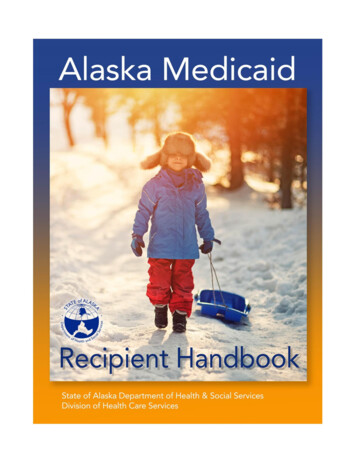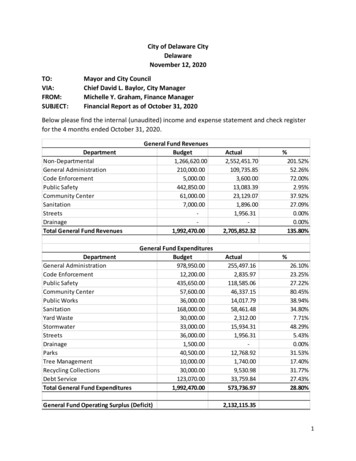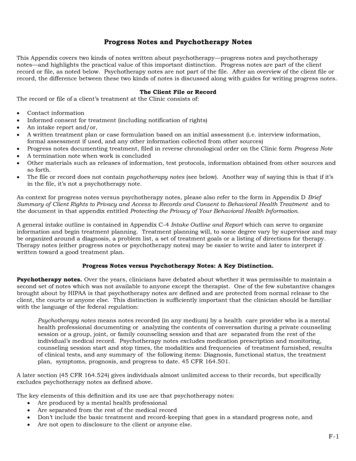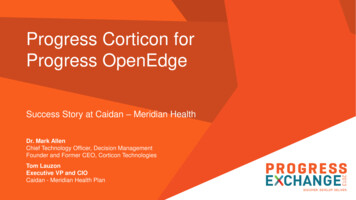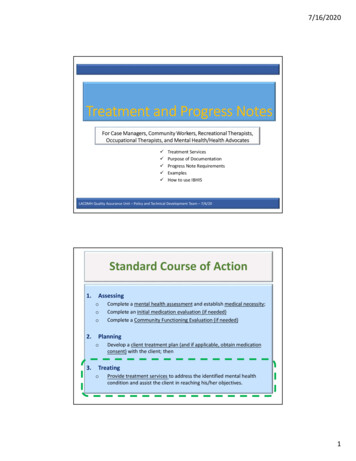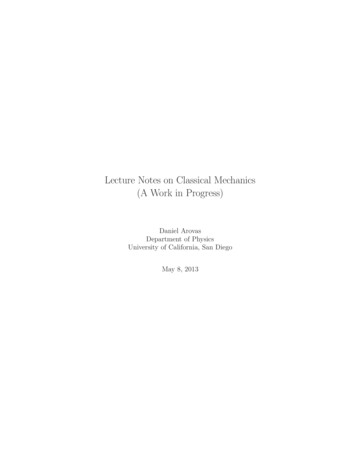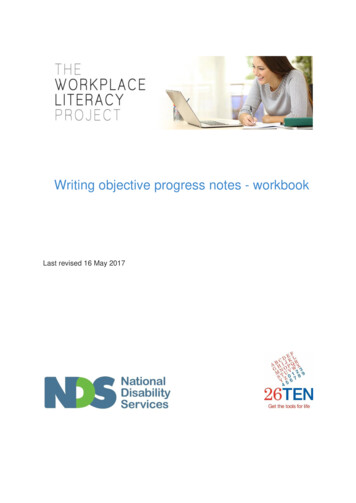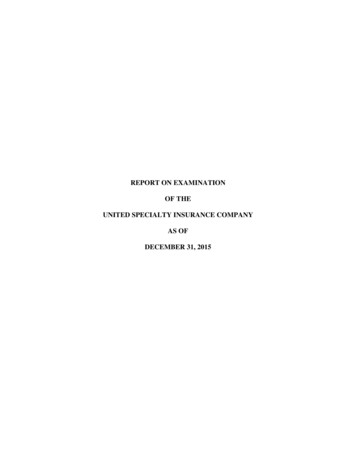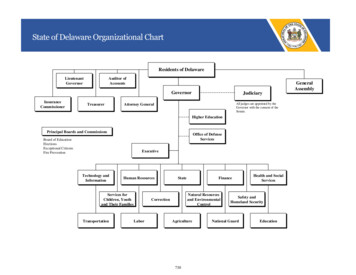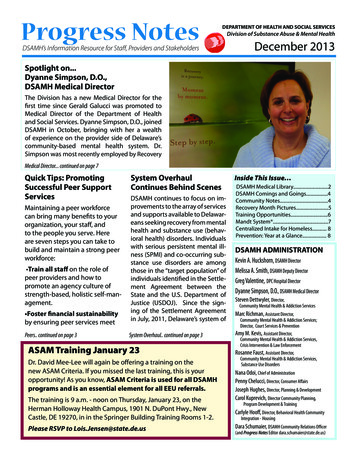
Transcription
Progress NotesDEPARTMENT OF HEALTH AND SOCIAL SERVICESDSAMH’s Information Resource for Staff, Providers and StakeholdersDivision of Substance Abuse & Mental HealthDecember 2013Spotlight on.Dyanne Simpson, D.O.,DSAMH Medical DirectorThe Division has a new Medical Director for thefirst time since Gerald Galucci was promoted toMedical Director of the Department of Healthand Social Services. Dyanne Simpson, D.O., joinedDSAMH in October, bringing with her a wealthof experience on the provider side of Delaware’scommunity-based mental health system. Dr.Simpson was most recently employed by RecoveryMedical Director. continued on page 7Quick Tips: PromotingSuccessful Peer SupportServicesMaintaining a peer workforcecan bring many benefits to yourorganization, your staff, andto the people you serve. Hereare seven steps you can take tobuild and maintain a strong peerworkforce: Train all staff on the role ofpeer providers and how topromote an agency culture ofstrength-based, holistic self-management. Foster financial sustainabilityby ensuring peer services meetPeers. continued on page 3System OverhaulContinues Behind ScenesDSAMH continues to focus on improvements to the array of servicesand supports available to Delawareans seeking recovery from mentalhealth and substance use (behavioral health) disorders. Individualswith serious persistent mental illness (SPMI) and co-occurring substance use disorders are amongthose in the “target population” ofindividuals identified in the Settlement Agreement between theState and the U.S. Department ofJustice (USDOJ). Since the signing of the Settlement Agreementin July, 2011, Delaware’s system ofSystem Overhaul. continued on page 3ASAM Training January 23Dr. David Mee-Lee will again be offering a training on thenew ASAM Criteria. If you missed the last training, this is youropportunity! As you know, ASAM Criteria is used for all DSAMHprograms and is an essential element for all EEU referrals.The training is 9 a.m. - noon on Thursday, January 23, on theHerman Holloway Health Campus, 1901 N. DuPont Hwy., NewCastle, DE 19270, in in the Springer Building Training Rooms 1-2.Please RSVP to Lois.Jensen@state.de.usInside This Issue DSAMH Medical Library.2DSAMH Comings and Goings.4Community Notes.4Recovery Month Pictures.5Training Opportunities.6Mandt System .7Centralized Intake for Homeless. 8Prevention: Year at a Glance. 8DSAMH ADMINISTRATIONKevin A. Huckshorn, DSAMH DirectorMelissa A. Smith, DSAMH Deputy DirectorGreg Valentine, DPC Hospital DirectorDyanne Simpson, D.O., DSAMH Medical DirectorSteven Dettwyler, Director,Community Mental Health & Addiction ServicesMarc Richman, Assistant Director,Community Mental Health & Addiction Services;Director, Court Services & PreventionAmy M. Kevis, Assistant Director,Community Mental Health & Addiction Services,Crisis Intervention & Law EnforcementRosanne Faust, Assistant Director,Community Mental Health & Addiction Services,Substance Use DisordersNana Odoi, Chief of AdministrationPenny Chelucci, Director, Consumer AffairsJoseph Hughes, Director, Planning & DevelopmentCarol Kuprevich, Director Community Planning,Program Development & TrainingCarlyle Hooff, Director, Behavioral Health CommunityIntegration - HousingDara Schumaier, DSAMH Community Relations Officer(and Progress Notes Editor dara.schumaier@state.de.us)
DSAMH Library Collection: Trauma Informed CareMental Health TransformationalGrant staff have been busyaugmenting the DSAMH Library’scollections. The library now has anarray of materials available thatprovide information on trauma,trauma-informed care, and traumarecovery. A list of books, DVD’s , andCD’s that are available in the libraryis included below. You can also findout what is available by going to theDelaware Library Catalog, locatedonline at www.lib.de.us. By using theAdvanced Search function, a searchcan be limited to the DSAMH library.However, other libraries, such as theDTCC and Wilmington Universitylibraries, may have useful resourcesas well.The DSAMH Medical Library islocated in the Springer Building andis open by appointment MondayThursday from 8 a.m. - 4:30 p.m. Thelibrary also recently added copiesof the newest edition of the ASAMcriteria.The American Sociaty of AddictionMedicine (ASAM) criteria, alsoknown as the ASAM patientplacement criteria, are the result ofa collaboration that began in the1980s to define one national setof criteria for providing outcomeorientated and results-based care inthe treatment of addiction. Todaythe criteria have become the mostwidely used and comprehensiveset of guidelines for placement,continued stay and transfer/discharge of patients with addictionand co-occurring conditions. TheASAM criteria are required in over 30states.The Trauma collection is summarizedbelow.CDs and DVDsBeyond Trauma Curriculum: A HealingJourney for Women by Stephanie S.Covington (CD)Healing Trauma: Strategies for abusedWomen by Stephanie S. CovingtonWhen Helping Hurts: Preventing andTreating Compassion Fatigue by JoyceBoaz (DVD)Making Peace with Chronic PTSD byMarla Handy (DVD)BOOKSNobody’s Child by Marie BalterNo Secrets No Lies: How Black FamiliesCan Heal From Sexual Abuse by RobinStoneTrauma Stewardship: An Everyday Guideto Caring for Self While Caring for Othersby Laura Van Dernoot & Connie BurkRestoring Sanctuary: A New OperatingSystem for Trauma-Informed Systemsof Care by Sandra L. Bloom & BrianFarragherDestroying Sanctuary: The Crisis inHuman Service Delivery Systems bySandra L. Bloom & Brian FarragherTrauma and Recovery: The Aftermathof Violence--from Domestic Abuse toPolitical Terror by Judith HermanEdition by Sandra L. BloomThe Courage to Heal 4e: A Guide forWomen Survivors of Child Sexual Abuse20th Anniversary Edition by Ellen Bassand Laura DavisThe Courage to Heal Workbook: AGuide for Women and Men Survivors ofChild Sexual Abuse by Laura DavisWaking the Tiger: Healing Trauma:The Innate Capacity to TransformOverwhelmingExperiencesbyPeter A. Levine (Author), AnnFrederick(Contributor)Violence in the Lives of Black Women:Battered, Black, and Blue by CarolynM. West, Ph.D. (Ed.)Madness: A Bipolar Life by MaryaHornbacherTransition of Youth and YoungAdults with Emotional or BehavioralDifficulties:AnEvidence-BasedHandbook Hewitt Clark ,Ph.D. BCBA,Deanne Unruh, Ph.D., Maryann Davis,Ph.D.Sisters of the Shadow by Maxine HarrisLife after Trauma Second Edition:A Workbook for Healing by DenaRosenbloomThe Twenty-Four Carat Buddha andOther Fables: Stories of Self-Discoveryby Maxine HarrisGetting Past Your Past: Take Control ofYour Life with Self-Help Techniques fromEMDR Therapy by Francine ShapiroUsing Trauma Theory to Design ServiceSystems: New Directions for MentalHealth Services, Number 89 (2001)Maxine Harris (Ed.) and Roger D.Fallot (Ed.)Reclaiming Your Life from a TraumaticExperience: A Prolonged ExposureTreatmentProgramWorkbook(Treatments That Work) by BarbaraRothbaum, Edna Foa, ElizabethHembreeSources and Expressions of Resiliencyin Trauma Survivors: Ecological Theory,Multicultural Practice Mary R Harvey(Editor), Pratyusha Tummala-Narra(Editor)Compassion Fatigue: Coping WithSecondary Traumatic Stress Disorder InThose Who Treat The Traumatized byCharles R. Figley (1995)TheBodyRemembers:ThePsychophysiology of Trauma andTrauma TreatmentbyBabetteRothschildCreating Sanctuary: Toward theEvolution of Sane Societies, Revised2Healing the Trauma of Abuse: AWomen’s Workbook by Mary EllenCopeland, MS, MA and Maxine Harris,Ph.D.Sexual Abuse in the Lives of WomenDiagnosed with Serious Mental Illnessby Maxine Harris & Christine L. LandisWomen of the Asylum: Voices fromBehind the Walls, 1840-1945 byJeffrey L. Geller and Maxine HarrisDown from the Pedestal: MovingBeyond the Idealized Images ofWomanhood by Maxine HarrisMONOGRAPHCreating Cultures of Trauma-InformedCare (CCTIC): A Self-Assessment andPlanning Protocol Roger D. Fallot,Ph.D. and Maxine Harris, Ph.D. July,2009
System Overhaul continued from page 1care has been under ongoing revision and enhancement to meet theDSAMH’s goals to provide traumainformed, person-centered, recovery-oriented care that meets therequirements of the USDOJ Settlement Agreement.Of especial interest is assuringthat individuals with SPMI and cooccurring substance use disorderscan access appropriate treatmentin the least restrictive environment. Increased attention is being paid to the struggles faced byindividuals seeking recovery fromaddictions and the need to provide an array of services that are“best practices,” focused on harmreduction, geographic accessibility and inclusive of community andpeer supports that offer individualsthe greatest chance for successfulrecovery. Important changes willcome with new contracts for thesubstance use disorder treatmentsystem. This includes expansionto all three counties of withdrawalsupport services, including ambulatory, social and clinically supervised detoxification services. Underthe existing system, medicallysupervised detoxification serviceshave been available only in NewCastle County (with 24/7 transportfrom Kent and Sussex). Variety andtypes of housing and case management supports also will change.The Division has concentrated significant time on efforts to amendDelaware’s State Medicaid Plan toallow the State to pull down moreFederal funds. The amended Planwill better align funding with services in a way that allows Delawareto maximize Federal participationand decrease reliance on StateTop Three Reasons Adults Did Not Get Mental HealthTreatment in 2012 They worried about affording the cost. They thought they could handle the problem without treatment. They did not know where to receive services.SAMHSA’s 2012 National Survey on Drug Use and Health (NSDUH) http://www.samhsa.gov/data/NSDUH/2k12MH FindingsandDetTables/Index.aspxPeers cont’d from page 1criteria for reimbursement likeMedicaid billing (when approvedfor direct billing by the specificstate) and have clear guidelineson how to bill for these services. Address boundary issues suchas if peer providers need to receive mental health or substanceuse services outside of the agency they work for. If peer providers choose to continue receivingthese services where they work,ensure their files are kept confidential to only approved staff. Require peer providers tocomplete formal training thatteaches them implementation ofholistic self-management skills. Write job descriptions for peerproviders to ensure they havemeaningful, defined roles withinthe care team. Train supervisors on the role ofpeer providers and how to support them. Implement personal self-management tools like a WellnessRecovery Action Plan (WRAP) forpeer providers to promote theirongoing recovery and #quick3General Revenue to support behavioral health services. This shiftin funding will make room for someexpansion of services, which is especially needed on the substanceuse treatment system side.Additionally, the State has beenworking on a Medicaid 1915ilike 1115 Demonstration WaiverAmendment to support a newhome and community-based services initiative called PROMISE(Promoting Optional Mental Healthfor Individuals through Supportsand Empowerment). The goal ofPROMISE is to improve State Planbehavioral health services care coordination for eligible clients withSPMI and co-occurring substanceuse disorders through the MCOs.It aims to improve clinical and recovery outcomes and increase theState’s capacity to contract for anddeliver community-based servicesand supports. PROMISE adds services with coordinated oversightprovided through case managersbased in the State’s CommunityMental Health Centers. These caremanagers assure that clients receive thorough independent assessments and that the personcentered recovery plans theycreate in partnership with theirproviders are monitored, neededservices are provided, supports areidentified and the plan of care isconstantly adjusted in response toongoing assessment, changing client goals and levels of functioning.This new initiative is an importantpart of the Division’s overall moveaway from direct care and towardsan emphasis on resource management, regulatory and provideroversight, quality assurance and atruly responsive system of care thatis, as much as possible, rooted inhome and community-based careprovision.
All About Us—DSAMH StaffNews, Comings and GoingsDSAMH welcomes new staff:Patricia BrooksJoycelyn Bennett-OjatunwaseJoseph CorlettaMarilyn HugheyJennifer GarciasNatalie WatsonDouglas HamiltonLawrence KaudererTanya TuckerGlendolyn NewmuisEbonese McManusOrlanda JohnsonChristina JonesAmanda PizziJerome PowellAda CunninghamYvonne OwensRoberta HardenCrystal WilliamsTerry FosterMelissa WarrenGerard McHaleBarbara Jordan-McGillRaymond Bash, Sr.Community Notes News and Updates Received from DSAMH PartnersDSAMH Progress Notes is happy to spread your news to our partnercommunity. Justemail the editor with anything you’d like to propose we include in our next issue.Received from Dave Parcher:For introductions, I am the Executive Director of the organizationknown as Kent Sussex Counseling Services. Our organizationcontracts with DSAMH to provider substance use treatment andprevention services. First and foremost, I would like to take thisopportunity to express my appreciation for your new letter. You doa great job on it. I enjoy reading it and find it very informative. I would like to ask that you include an announcement of ourorganizations name change. Effective Friday September 6th 2013our name has changed from the Central Delaware Committeeon Alcohol and Drug Abuse trading as Kent Sussex CounselingServices to Kent Sussex Community Services. Our organizationhas traditionally been a treatment center for substance use(SU) employing both non medication and medication assistedoutpatient treatment to include counseling since 1970. Althoughoutpatient SU treatment continues to be a major component ofour organization, our constellation of services has evolved over theyears to a community services focus that includes long term carecase management, prevention, transportation, and home basedservices. We believe our new name allows us to discontinue usinga trade name that is different from our corporate name and have aname that is more reflective of our current mission.land said farewell to Joseph GrantRuthea Britt-GalesLaVern EdwardsSarah JonesAnthony KelsonTasha BrownCharles NyangwaraAnna ChenjoClara HollisRandy JacksonDana Lynn GeorgeKirsten SchneiderHelen HanlonMarcia LisDalieta MearsKennedy MuriukiRichard LombinoFrom the Delaware Consumer Recovery Coalition:Keith Miller joined the staff of the Delaware Consumer RecoveryCoalition as the Communications and Logistics Specialist. Hebrings a wealth of skill that will enhance our ability to communicate the DCRC’s advocacy and wellness initiatives around the state.You can reach him at keith@delawarerecovery.org or call our mainphone line at (302) 689-DCRC. Help welcome him aboard!Please look for our electronic Weekly Updates which come to youby email at the beginning of each week. If you do not presentlyreceive the Weekly Update and would like to sign up, send anemail to info@delawarerecovery.org and we will add you to ourlist. The Weekly Update will also be posted to our website (www.delawarerecovery.org) along with our events and civic engagement opportunities.Our Grassroots Exchange meetings are a high priority of ours, andthey are now happening on the fourth Thursday of every month.Check the website for details: www.delawarerecovery.org4
Recovery Month 2013Thank you to Sussex CountyTASC’s Matt Moore, Blair Rodgers and Kay Baker, along withMobile Crisis InterventionServices-So. Del. Director JeanBurgess, Training Office staffChris Knox, and a number ofCentral Office staff and other How big a serenity prayer circle can you make with a half-dozen softball teams?volunteers for participating onDSAMH’s softball team at the2013 Annual Recovery MonthSoftball Tournament, organized each year by The Lighthouse, Brandywine Counseling and Community Services,and supported by a DSAMHminigrant.Service providers fielded fiveteams composed of staff andclients. DSAMH had 13 staffmembers participate in thetournament. DSAMH won onegame and lost two, scored 14runs with five home runs intotal and placed fourth in thetournament but vowed to doJean Burgess watches the first game Thresholds at bat; Georgetown TASC’s Kay Baker catchesbetter next year. The eventprovides a great day playingsoftball and meeting many,many DSAMH clients. Moreimportantly, DSAMH wasgrateful for the opportunity itprovided DSAMH staff to showsupport and appreciation forthe efforts of dozens of staff ofour Southern Delaware substance abuse providers.Senior DSAMH staff also tookpart in the Recovery Rally indowntown Wilmington thatwas sponsored by the RickvanStory Recovery Center onthe same day, September 27.DSAMH’s Marc Richman hits one.5
DSAMH Training OpportunitiesWORKSHOP OPPORTUNITIES THROUGH March 2014Remember: Check DTOOL regularly as new opportunities are added weekly!DSAMH Training Office On Line at http://dtool.dhss.delaware.gov is accessible for everyone to manageyour learning personally. Use this tool to change your contact information, obtain a copy of your transcript, sign up and cancel workshop attendance, and see what is being offered in the months ahead.CPR HeartsaverJanuary 6 or 21 or 28 or February 3 9 a.m.or February 17 or March 17 1 p.m.CPR: BLS for Healthcare ProvidersJanuary 13 or 279 a.m.or February 10Lower Sussex Training Rm., H. Holloway Campus (NCC)Lower Sussex Training Rm., H. Holloway Campus (NCC)Lower Sussex Training Rm. H. Holloway Campus (NCC)Overview of DSM – 5 Sub Abuse & GamblingJanuary 249 a.m.January 309 a.m.Hampton Inn, Rehoboth Beach (SC)Mt. Salem United Methodist Church, Wilmington (NCC)Intro to Word for WindowsJanuary 810 a.m.Computer Training Center (NCC)Advanced Word for WindowsFeb 1110 a.m.Computer Training Center (NCC)Intro to ExcelMar 1310 a.m.Computer Training Center (NCC)HIV/STD/HepatitisHIV/STD/Hepatitis C 201Feb 119 a.m.HIV/STD/Hepatitis C PresentationFebruary 13-149 a.m.HIV/STD/Hepatitis C 101Mar 119 a.m.The Lessons of Racism of the Well-IntendedFeb 209 a.m.Feb 219 a.m.Hudson State Service Center, Newark (NCC)Hudson State Service Center, Newark (NCC)Hudson State Service Center, Newark (NCC)Hampton Inn, Rehoboth Beach (SC)Mt. Salem United Methodist Church, Wilmington (NCC)Get Hip to HIPAAIf a client at DPC has a reportable contagiousillness, DPC must report the occurrence to theCDC as required by health laws. HOWEVER, it isnot permissible for the information to be givento anyone else. If a staff member is exposed tothe illness, only that information may be given toothers, including the medical staff treating that staffmember. It is a violation of HIPAA to disclose thename of the client who may have infected the staffperson to third parties, including Human Resources.6
Mandt System The Mandt System, Inc., developedThe Mandt System --an internationalstaff development and training process-- has certified trainers in frommost American states, Canadianprovinces of Prince Edward Island,Alberta and Ontario, Hong Kong, andAustralia’s Victoria, as well as mostother states. Certified trainers haveused The Mandt System in waysthat brought dignity, respect, integrity, safety, and most of all hope, to thepeople they served. These peoplework in schools, mental health centers, police academies, psychiatrichospitals, after school programs,homeless shelters, group homesand juvenile correction centers, justto name a few places this systemis used. The ultimate goal of thissystem is ensuring safety for all whilepromoting an organizational commitment toward restraint reductionand elimination.In all these various locales, trainershave taken the same materials, thesame principles, the same content,and done three things: Amplify,Adapt, Apply. Let’s take a few minutes to talk about each one of theseideas and how they have been effective in these settings. Adapt andApply will be in subsequent DSAMHnewsletters.Amplify – One of the master trainers’son is a musician, and plays a varietyof instruments, but his favorite is theguitar. He usually plays acoustic guitar, but every so often he plugs intoan amplifier. An amplifier does muchmore than make a sound louder – itadds depth, richness, warmth, andvolume. When trainers amplify TheMandt System , they take the “music” we have written, and use theirown lives, their own experiences toteach the program. Instead of saying “Mandt believes,” they say “webelieve.” In our program, we consciously focus on teaching principles,not techniques. These principlesare then amplified by the wealth ofexperience, knowledge, and passionof each trainer.When The Mandt System is amplified in this way, the words in themanual, the ideas in the PowerPoint become real. Without this amplification, the material we teach would notbe nearly as effective as it has been.The outcomes people share – lowered restraint rates, lowered injuryrates, increased feelings of safety andmorale – all start with Amplification.Dr. Simpson continued from page 1Innovations, Inc., working at theirWilmington Recovery City locationand serving Arizona-based RI as RI’sMedical Director for all its Delawareoperations. Prior to that, she wasaffiliated with Connections and withJohns Hopkins.A lifelong Delawarean, Dr. Simpsonenjoys traveling and shares herabode with a three-legged catnamed Finnigan.DSAMH welcomes Dr. Simpsonand looks forward to her manycontributions to further Delaware’sexcellence in care provision!JANUARY DHSS MOBILE BLOOD DRIVE:WE NEED YOUR HELP!In memory of the spirit of Dr. King, DHSS and DPH will host mobile blood drives at Holloway and inDover as part of the MLK Day commemoration Jan. 13-20,organized by the State Office of Volunteerism. To make these blood drives go, we need your support.For State employees, donating blood is counted as part of your DHSS workday. Please check withyour supervisor before registering to make sure you can be spared during the time you are away. Andthen it’s simple as making an appointment – either by calling 888-8BLOOD8 or signing up online atwww.delmarvablood.org and using sponsor code: HHHSTuesday, January 14, 9 a.m.-1 p.m.Division of Public Health parking lot417 Federal St., Dover(40 sign-ups needed)Friday, January 17, 9 a.m.-3 p.m.Springer Building Gym, Herman Holloway Campus1901 N. DuPont Hwy (US 13), New Castle(75 sign-ups needed)For more information, please email jill.fredel@state.de.us or call 255-9047.Thank you for your service to others!7
NEW: Centralized Intake for HomelessnessDelaware’s Homeless Prevention and Response System now has coordinated statewide referral and assessment process called Centralized Intake. Thisprogram, designed specifically to improve the ability of persons in housingcrisis to access services that best meet their needs (and for which they areeligible) launched on January 6 and operates weekdays from 8 a.m. until 5p.m. Here’s how it works:www.hpcdelaware.orgIf you/someone you know is homeless: Call 2-1-1. Tell the Delaware 2-1-1 operator about the housing crisis.Answer a few questions todetermine who can help (aPrevention! It’s SAMHSA’s top priority! The calendar below is part of anprevention specialist in theexceptional publication, Month-by-Month Prevention and Promotion Call to Action and Plancommunity or a housingning Guide: A Comprehensive Guide to Help Plan Your Monthly Substance Abuse Prevention and Mentalspecialist).Health Promotion Awareness Events. This booklet was produced by the 2011-13 CohortIf referred to a housing speof the CSAP Prevention Fellowship Program. DSAMH’s 2011-13 Prevention Felcialist, an intake and assesslow, Usoamaka Aneke contributed to this important work which is chock-fullment will be set up. Be sureof ideas. You can access the entire 174-page document online at:to leave clear contact sources.html.mation if you have to leaveyearly awareneSS Calendar at-a-glanCea message: your call will bereturned that same day.JanuaryfebruaryMarChaPrilBased on the assessment,the person receives a referral to the most appropriateservices for which s/he iseligible (e.g., shelter, temporary housing, permanentsupportive housing, othersupportive services, etc.).Kitara Bingham is the Centralized Intake Program Director,responsible for implementing the program. Four mobilehousing specialists--two inNew Castle County and oneeach in Kent and Sussex Counties-- will perform intakes andassessments. Data collectedvia this new intake processwill allow Delaware to identify both strengths and gapsin the service system, whilealso ensuring each person receives services best suited toindividual needs. To learn moreabout the Homeless PlanningCouncil and Centralized intake,please call Susan Starrett at302.654.0126 ext. 101.Focus On:Focus On:fetal impactawarenessCoa awareness National Heart Month National Wear Red Day(1st Friday) Children of Alcoholics Week(3rd Week) National Birth DefectsMonth National Drug Facts week(Last Week)Focus On:drugs and the brainawareness Brain Injury AwarenessMonth Inhalant & PoisonAwareness Week (3rdWeek) Kick Butts Day(3rd Wednesday)MayJuneJulyFocus On:Focus On:Focus On:Mental healthPromotion awarenessMarijuana use andabuse awareness Mental Health Month National Children’s MentalHealth Awareness Week(2nd Week) ATOD Related Birth DefectsWeek (2nd Week) National Prevention Week(3rd Week) International Day AgainstDrug Abuse(June 26) National HIV Testing Day(4th Wednesday)rx. drug abuse World Hepatitis DayFocus On:alcohol abuseawareness Alcohol Awareness Month National Alcohol ScreeningDay (1st Thursday) Alcohol Free Weekend(1st Weekend) World Health Day(1st Saturday)auguStFocus On:your Community needs International OverdoseAwareness Day(August 31) National Night Out(August 6) World No Tobacco Day(May 31)SePteMberFocus On:oCtoberFocus On:noveMberFocus On:recovery awarenessPrevention awarenesstobacco awareness National Recovery Month FASD Awareness Day(2nd Sunday) National Suicide PreventionWeek (2nd Week) World Heart Day(September 30) National Substance AbusePrevention Month Mental Health AwarenessWeek (2nd Week) World Mental Health Day(October 10) College Alcohol AwarenessWeek (3rd Week) Lung Cancer AwarenessMonth COPD Awareness Month Great American Smoke-out(3rd Thursday) International Survivors ofSuicide Day (November 17) National Red Ribbon Week(4th Week)8PFP: PrEvEnTion AnD ProMoTion 5deCeMberFocus On:drinking, drugs& driving awareness National 3-D Month(Drugged, Drinking &Driving) World AIDS Awareness Day
Foster financial sustainability by ensuring peer services meet ASAM Training January 23 Dr. David Mee-Lee will again be offering a training on the new ASAM Criteria. If you missed the last training, this is your opportunity! As you know, ASAM Criteria is used for all DSAMH pr
